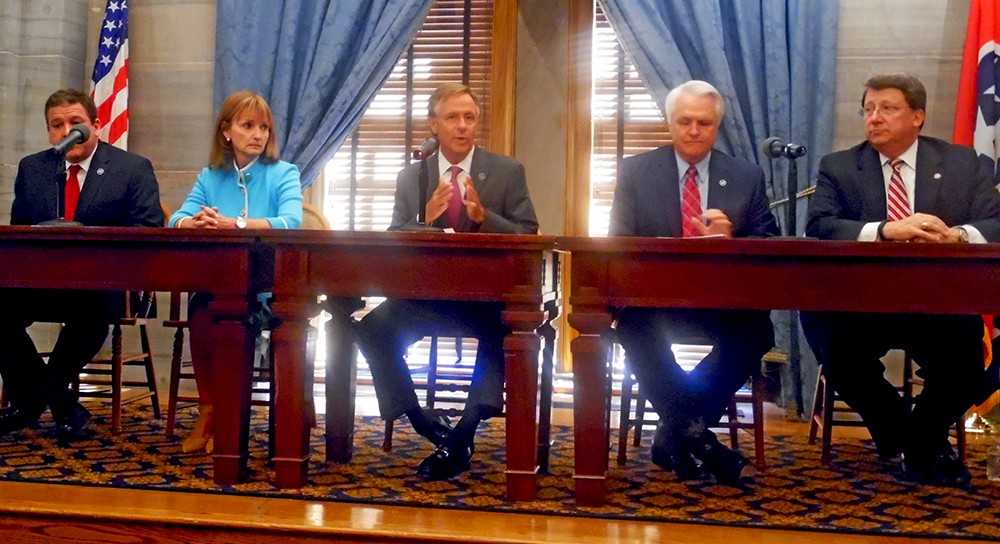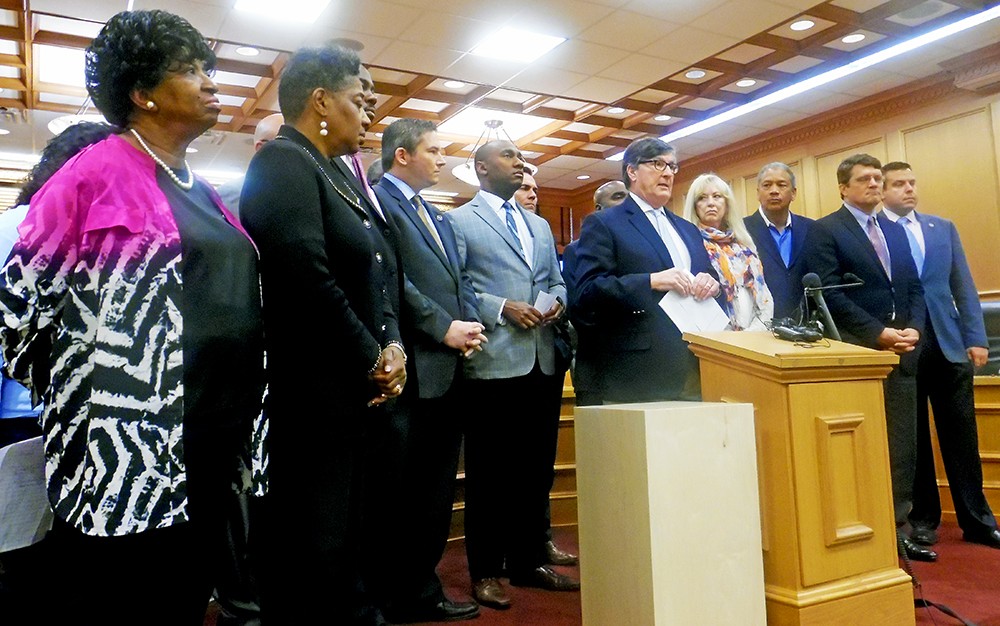NASHVILLE — By means of what many supporters of Medicaid expansion in Tennessee see as a stacked deck, an ad hoc state Senate Health and Welfare Committee last week aborted Governor Bill Haslam‘s special session and seemingly killed his Insure Tennessee proposal last week with a 7-4 vote against it on Wednesday — not quite two days after the special session had kicked off with an optimistic address by Haslam.
That vote, from a committee whose normal membership had been altered by Lieutenant Governor Ron Ramsey, the Senate speaker, effectively halted what would have been a gauntlet run for the proposal through a series of other committees, and prevented the proposal — which was couched in the form of a joint resolution — from reaching the floor of either the House or the Senate for a floor vote.
In the immediate aftermath of the committee vote, supporters of Insure Tennessee pointed out that the regular nine-member Senate Health Committee, which will reconstitute for the regular session that began this week, contains five members presumed to have been for the Insure Tennessee proposal, including the Senate sponsor, Doug Overbey (R-Maryville).
Ramsey’s ad hoc version — reshuffled, according to the Senate speaker, so as to insure that all 33 members of the Senate were evenly apportioned on the three committees that could potentially hear the bill — contained from the start a preponderance of skeptics regarding Haslam’s proposed plan.
That hurt the proposal’s prospects, and so did the reluctance to endorse the bill of key Republican leaders — Ramsey and Majority Leader Mark Norris (R-Collierville) in the Senate and Speaker Beth Harwell (R-Nashville) in the House.
Much of the resistance to the Haslam proposal was clearly based on the opponents’ ideological hostility to the Affordable Care Act, the health-care system designed by the Obama administration to expand insurance coverage — in partnership, essentially, with private insurors. A component of the act has been the provision of billions of dollars in annual grants to participating states to expand their Medicaid programs. In Tennessee, as Haslam and others pointed out, that would have meant outlays of $1.4 billion annually to TennCare, the state’s version of Medicaid.
Although there were numerous Republicans prepared to vote for the bill, particularly in the House, GOP ideologues denounced the measure as “Obamacare,” despite numerous nods to marketplace methods in the Haslam version and kept on repeating discredited assertions (e.g., that the federal government would ultimately default on funding, sticking Tennessee with the bill, or that the state would not be able to extricate itself from Insure Tennessee, even though Haslam devised it as a two-year pilot program with an automatic fail-safe cut-off mechanism should assumptions prove incorrect or circumstances turn even slightly adverse).
Opponents were aided by a show of force in the hearing rooms by red-shirted representatives of “Americans for Prosperity,” a shell organization funded by the billionaire Koch brothers, who also paid for ads accusing Republican supporters of Insure Tennessee-like state Representative Jimmy Eldridge (R-Jackson) — of having “betrayed” Tennessee.
Predictably, there was a firestorm of criticism in the aftermath of the bill’s rejection, from legislative Democrats and from some Republicans as well, from representatives of Chambers of Commerce and from the Tennessee Hospital Association, whose member institutions had guaranteed to pay whatever future expenses for Insure Tennessee that the federal funding did not directly cover.
The Shelby County Commission, which had voted 12-0 to encourage legislative support for Insure Tennessee three weeks ago, reacted to the proposal’s defeat with a 10-1-1 vote for a fresh resolution on Monday, sponsored by conservative Republican Terry Roland of Millington, urging that the Haslam proposal be reconsidered in the regular session now begun. The desperate financial needs of The Med (now known as Regional One Health) and the predicament of Tennessee’s uninsured population were cited by another GOP conservative, Mark Billingsley of Germantown.
Weighing in at some length also was Republican County Mayor Mark Luttrell, who said, among other things, “I think our citizens in Shelby County deserve more. There should have been a full hearing before the Tennessee General Assembly.”
And, amid calls in the General Assembly itself for renewed consideration of Insure Tennessee, Governor Haslam, whose initial statements following rejection of his proposal were fatalistic, included some determined, even upbeat-sounding statements in his “State of the State” address to a joint session Monday night.
From the governor’s speech: “Last week, the decision was made not to move forward with Insure Tennessee. However, that does not mean the issues around health care go away. Too many Tennesseans are still not getting health coverage they need in the right way, in the right place, at the right time. An emergency room is not the place where so many Tennesseans should be going for health-care services. It’s not the best health care for them, and it’s costing us a lot more in the long run.
“Health-care costs are still eating up too much of our state’s budget and impacting the federal deficit and nation’s debt. According to the Congressional Budget Office, if we maintained health-care costs at their current levels, which we know are inflated, for the next eight years — just kept them flat — we’d eliminate the nation’s deficit. To do that, we can’t keep doing what we have been doing.
“So, though the special session has ended, I hope we can find a way to work together to address
those problems.”
• The Memphis mayoral race, just as many expected, and just as some — existing candidates included — were hoping, is filling up. The latest to declare a candidacy is Shelby County Commission Chairman Justin Ford, who had promised the media he would reveal his decision to them on February 9th. And, came Monday, February 9th, Ford did just that.
In a conversation with reporters during breaks in Monday’s commission meeting at the County Building, Ford said he’d been thinking about a mayoral race for four or five years (or about the time he was first elected to the commission in 2010), and, after paying brief homage to the Ford family’s commitment to public service, made special note that his father, former councilman, commissioner, and interim county mayor Joe Ford, was able to raise “half a million dollars” in a race against then Mayor Willie Herenton in 1999.
“It won’t be [any] different this time,” avowed Ford, who said he would run on issues of economic development, health care, education, and public safety.
Asked about the fact that the mayoral field was fast multiplying, Ford said, “The more the merrier. When you look at any type of race, especially in this democracy, in the city of Memphis, we’re accustomed to change. The more people in the race the better. They bring different perspectives [for] the opportunity for people to make the decision whether or not they want some change.”
Victory, he said, could come to “whoever has a resounding message, goes door to door, and also raises the right amount of money.”
Ford said he was aware that both Mayor A C Wharton and Councilman Jim Strickland, a declared mayoral candidate, had already raised prodigious amounts of money. “I’ve seen their financial disclosures,” he said.
As an incumbent, Wharton had a head start, Ford acknowledged. “Incumbents are hard to beat, so at the end of the day, if you don’t have a focus and have a real plan, you might not be successful.” But, he noted, “We’re a long, long way from the finish line.” And a few months, for that matter, before petitions for the October election become available in April.
Other candidates already declared are Wharton, Strickland, former Commissioner James Harvey, and former U of M athlete Detric Golden. Considered likely to enter the race are Councilman Harold Collins, New Olivet Baptist Church Pastor and former School Board member Kenneth Whalum Jr., and Memphis Police Association President Mike Williams.
• An effort last Wednesday by county Commissioner Steve Basar to hold a review of the joint city/county EDGE (Economic Development and Growth Engine) board — billed as an “update” on the published Commission agenda for Basar’s economic development committee — was forestalled, with several members insisting on the presence of EDGE board members before having such a discussion. Basar agreed to defer the discussion until the presence of board members, who had not been invited to last week’s commission session, could be arranged, likely in March.

 JB
JB  JB
JB 





